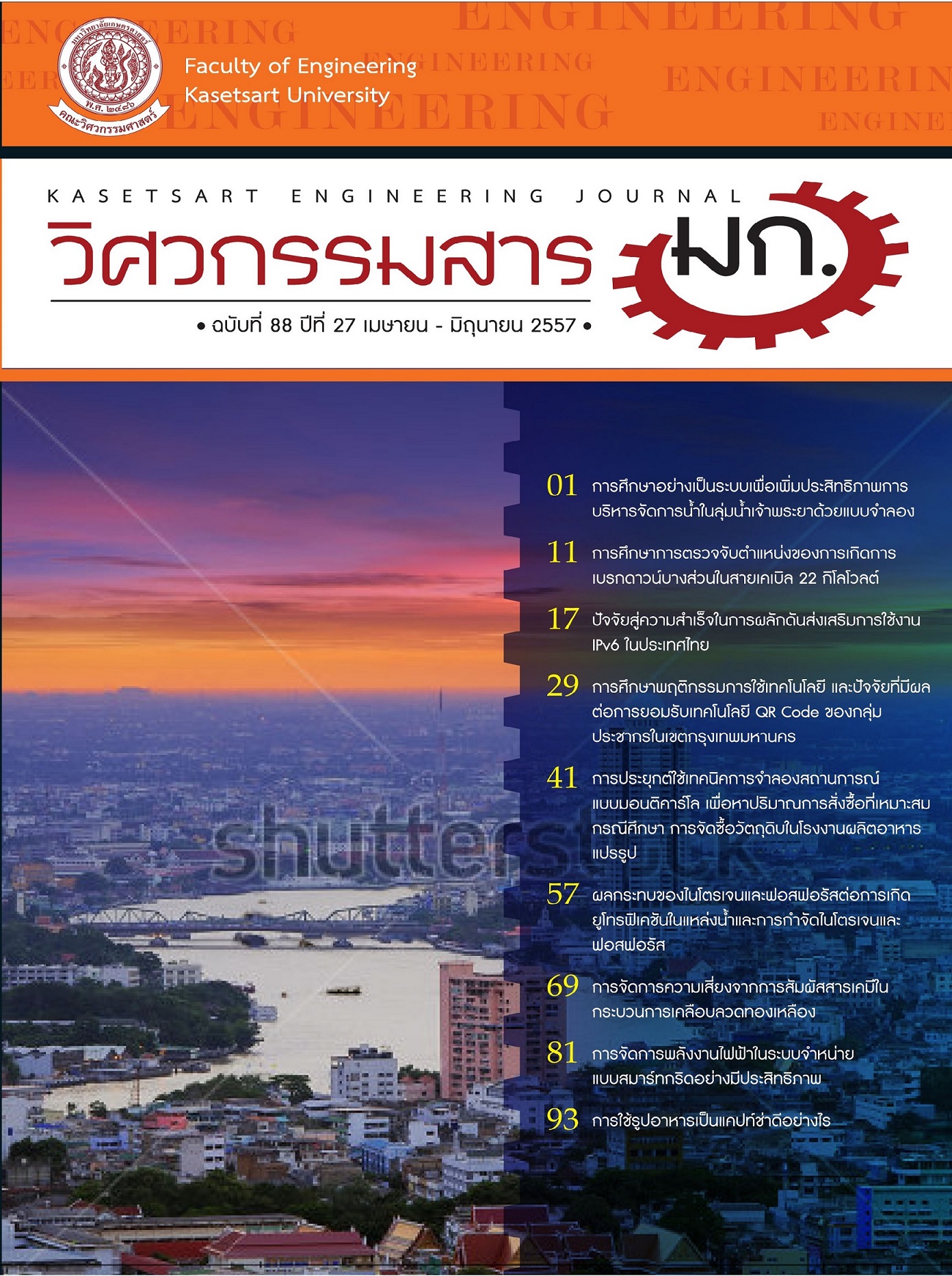การประยุกต์ใช้เทคนิคการจำลองสถานการณ์แบบมอนติคาร์โล เพื่อหาปริมาณการสั่งซื้อที่เหมาะสม กรณีศึกษาการจัดซื้อวัตถุดิบในโรงงานผลิตอาหารแปรรูป
Keywords:
เทคนิคการจำลองสถานการณ์แบบมอนติคาร์โล, การจัดการสินค้าคงคลัง, อาหารแปรรูป, monte carlo simulation, inventory management, processed foodAbstract
งานวิจัยนี้มีวัตถุประสงค์เพื่อหานโยบายการสั่งซื้อที่เหมาะสมของวัตถุดิบที่ใช้ในโรงงานผลิตอาหารแปรรูปประเภทไส้กรอก ซึ่งในปัจจุบันโรงงานได้เลือกใช้นโยบายการสั่งซื้อที่กำหนดตามข้อมูลความต้องการใช้วัตถุดิบที่เกิดขึ้นในอดีต ที่มีจำนวนรอบของการสั่งซื้อคงที่ รูปแบบการสั่งซื้อวัตถุดิบสดแบบเก่า ได้แก่ การสั่งซื้อโครงไก่และเนื้อไก่ ครั้งละมากๆเพื่อจัดเก็บไว้ใช้ผลิต ส่งผลให้มีปริมาณการจัดเก็บมากเกินไป และทำให้ต้นทุนรวมในการจัดการสินค้าคงคลังสูงขึ้น ดังนั้นผู้วิจัยจึงประยุกต์ใช้เทคนิคการจำลองสถานการณ์แบบมอนติคาร์โล เพื่อหานโยบายในการสั่งซื้อและจุดสั่งซื้อที่เหมาะสม โดยคัดเลือกวัคถุดิบที่มีความต้องการใช้มากที่สุดมาใช้พิจารณาในงานวิจัย จากข้อมูลที่ได้ทำการศึกษาโดยใช้หลักการ ABC พบว่าสามารถจำแนกวัตถุดิบที่จัดอยู่ในกลุ่ม A ได้ 3 ชนิด คือ โครงไก่ เนื้อไก่ และแป้งมันจากนั้นเก็บข้อมูลปริมาณความต้องการใช้วัตถุดิบในอดีตแต่ละชนิด เพื่อสร้างเป็นตารางการแจกแจงความน่าจะเป็นของข้อมูลความต้องการกำหนดความต้องการวัตถุดิบคงคลัง เพื่อกำหนดนโยบายการสั่งซื้อและจุดสั่งซื้อของวัตถุดิบทั้ง 3 ชนิด ได้ทั้งหมด 27 นโยบาย จำลองสถานการณ์เพื่อหานโยบายคำสั่งซื้อที่ทำให้เกิดต้นทุนรวมในการจัดการสินค้าคงคลังที่ต่ำที่สุด โดยพบว่าปริมาณการสั่งซื้อที่เหมาะสม และจุดสั่งซื้อที่เหมาะสมที่ทำให้ต้นทุนรวมของการจัดการสินค้าคงคลังของวัตถุดิบทั้ง 3 ชนิดต่ำสุด ประกอบด้วยปริมาณการสั่งซื้อโครงไก่ เนื้อไก่ และแป้งมัน เท่ากับ 4,400 1,000 และ 930 กิโลกรัมต่อครั้ง ตามลำดับ และที่จุดสั่งซื้อโครงไก่ เนื้อไก่ และแป้งมันที่เหมาะสมเท่ากับ 5,904 1,416 และ 2,760 กิโลกรัม ตามลำดับ นอกจากนี้ยังพบว่า นโยบายคำสั่งซื้อแบบใหม่ทำให้เกิดต้นทุนในการจัดการสินค้าคงคลังต่ำสุด เป็นจำนวนเงิน 20,010,855 บาทภายใต้ข้อมูลต้นทุนรวมที่มีการกระจายตัวแบบปกติ และจำนวนรอบในการทดลองที่เหมาะสม ผลจากการจำลองสถานการณ์ในรอบวันผลิตที่ 90 วัน สามารถลดต้นทุนรวมในการจัดการสินค้าคงคลังที่เกิดขึ้นจากนโยบายคำสั่งซื้อเดิมได้ 12,448,765 บาท หรือคิดเป็นสัดส่วนที่ลดลงไปถึงร้อยละ 38.35
An Application of Monte Carlo Simulation for Optimal Order Quantity : A Case Study of Raw Materials Procurement in Processed food Industry
This research aims to find the optimal order policies of the raw materials used in the production of sausage; processed food. At present, this company uses policy to purchase required raw materials according to the demand from the past at a steady order cycle. From the past, they purchased large amount of fresh ingredients, including chicken meat and chicken skeletal which resulted the production storage too. As a result, the total cost of inventory increased. The research was applied to a Monte Carlo simulation in order to determine the purchase order policy and the optimal order by selecting the most demand raw materials to be applied in the research. The data was conducted by using ABC Analysis; it was able to identify materials that are inGroup A with 3 different categories of chicken skeletal, chicken meat and tapioca starch, then collecting the data for demand raw materials in each category from the past in order to create a probability distribution table of the data requirements. The demand of raw materials inventory in order to make an optimal purchase order for the 3 categories; 27 policies are stimulated to determine the optimal order for minimizing an inventory cost as much as possible. It was found that the optimal quantity and the appropriate order to minimize the total inventory cost of raw materials as the followings; the volume of order for chicken skeletal consisting of 4,400 kg. at the appropriate order is 5,904 kg., the volume of order for chicken meat consisting of 1,000 kg. at the appropriate order is 1,416 kg. and the volume of order for tapioca starch consisting of 930 kg. at the appropriate order is 2,760 kg.It was found that the new purchase order policy are in the lowest cost of inventory at THB 20,010,855 under the normal distribution cost and proper experiment number of order cycle. As a result from 90 days of order cycle; this stimulation is able to save inventory cost which was incurred from the past at THB 12,448,765 or 38.35% reduction rate.


